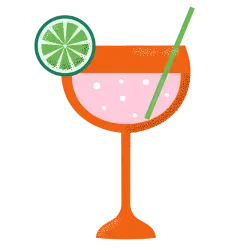As one of the top ten most profitable sectors in one of the largest alcoholic beverage markets in the U.S., introducing booze at your Florida business establishment could certainly prove a smart business move.[1]NCBI.”The Alcohol Marketing Landscape: Alcohol Industry Size, Structure, Strategies, and Public Health Responses.” Accessed Date It’ll Be Published But to do so requires a liquor license issued from Florida. Read on for our comprehensive guide on obtaining and managing your Florida state liquor license—everything from the different types you might apply for to application requirements, costs, and even renewal procedures.
Types of Florida Liquor Licenses

Florida has several large categories of liquor licenses, including dozens of different licenses and applications. To give you an idea—there’s even a category for sacramental wine served at religious institutions! Considerations include whether your alcohol goes on or off-premises and your county’s location and population size. These are called quota licenses, issued in a finite number in Florida’s most populated counties. So, if you’re in the market to acquire one, you’ll need to purchase it from an established license holder or participate in a state-run lottery. Serving a range of diverse business models, each license ensures that each kind of establishment complies with state regulations.
In other words, whether you own a restaurant, bar, nightclub, hospitality location, or retail store, there’s a specific liquor license in Florida to meet your needs. Find the most common types broken down here:

Types of Florida liquor licenses
- APS Licenses (Alcohol Package Sales). Typically issued to grocery stores, liquor stores, and convenience stores that sell pre-packaged beer or wine for carryout consumption.
- COP Licenses (Consumption on Premises). For bars and restaurants. Issued in numbered levels depending on whether you serve (1)beer, (2)beer+wine, (3)beer+wine+mixed, or (4)have a full bar.
- SRX/SFS License (Specialty Restaurant or Food Service). Changed as of 2023 to make it easier for smaller establishments to get a liquor license. This applies to all restaurants over 2,000 square feet or 120 seats.
- CMB license. (Cereal Malt Beverages) are Brewery licenses to sell and serve malt beverages from a brewery, microbrewery, or brewpub, with a production limit of 5,000 bbls/10,000 kegs a year.
- Quota Licenses. The most inclusive license type allows an establishment to serve beer, wine, and all types of liquor on-premises or through packaged sales. Issued in a finite number and determined by the size and population of the county in which you operate. Acquired through a state-run lottery or bought/sold from previous license holders.

Types of packaged alcohol licenses in Florida
Let’s take the example of a retail store selling packaged and sealed beverages for consumption elsewhere. Here’s a breakdown of licenses based on what type of beverages are sold:
- 1APS license. The most basic liquor license allows a store to sell packaged beer (only) for off-site consumption.
- 2APS license. Issued to grocery stores and other retail stores, allowing a business to sell packaged wine and beer (only) for off-premise consumption.
- 3APS license. Permits the sale of all types of sealed alcohol as an off-premises license, not eligible for on-premises consumption.
- 4COP licence. Allows a business to sell ALL types of spirits, wine, and beer, but reserved for consumption on-premises.
You can learn more by contacting the Florida’s Department of Business and Professional Regulation.

What type of liquor license do I need?
Whether you own a retail store, a food service establishment looking to serve beer and wine, or a bar or nightclub with a full bar, Florida’s got a liquor license for you [2]Alcohol and Tobacco Tax and Trade Bureau. “Liquor Laws and Regulations for Retail Dealers”. Accessed Date It’ll Be Published.. Which one depends on factors such as your business type, size, location, intended hours of alcohol sales, the specific beverages you plan to offer, and whether sold packaged or served.
Secondly, many of these licenses are also based on population, which means they’re issued as quota licenses. As the name implies, only a certain number are available in any given county. To acquire one could mean purchasing from another license holder who’s selling (due to a business change, shuttering, or retirement). The sale of these licenses is entirely based on supply and demand. You can find established, for-sale liquor licenses on public marketplaces, through specialty brokers, or through the annual, state-run lottery.
Finally, purchasing a quota license does not fall under any government oversight. Use caution when buying or selling a Florida state liquor license. If you need help connecting with a reputable marketplace or authorized broker, work with an experienced merchant service provider specializing in high-risk industries who can help you navigate specific rules and regulations related to alcohol.
Here are a few extra pointers broken down by business establishment:
Retail Stores
Sellers of packaged alcoholic beverages must register with several agencies, such as the Alcohol and Tobacco Tax and Trade Bureau and the local Florida Alcohol Beverage Control Board. Although the special tax for retail dealers has been repealed, you must still register with the state tax bureau.
Bars and nightclubs
As of 2023, bars and nightclubs will require a quota license if they serve more than 49% of their sales in alcoholic beverages. You’re required to already have a Florida seller’s permit.
Restaurant and food service establishments
There are strict regulations and additional requirements for food service establishments in Florida, such as minimum square footage and seating capacities. You’re considered a restaurant or food service establishment if you take in 51% or more of your revenue in food sales and other (non-alcoholic beverages). Make sure you already have a seller’s permit, then look to apply to the 4COP/SFS license.
Additional subcategories of licenses exist, each with rules and terms based on the business type. For more assistance, consult your local SBA offices or Women’s Business Center – or work with an experienced merchant service provider to help.
Liquor License Requirements for Florida
How to get a liquor license in Florida involves more than just a simple application and application fee. In addition to all your necessary business permits, ensure you comply with all zoning regulations, health inspections, and public posting rules as necessary. The full list of requirements include:

Basic business requirements
- The completed application form. This will include general information on the applicant and investors, any applicable management contracts, and copies of relevant business documents (articles of incorporation, etc.).
- Right of Occupancy. A lease or deed establishing your legal rights to occupy your location.
- Zoning permit. Zoning approval from your local government and proof of authorization to serve or sell alcohol. Many municipalities have rules about where you can open a business selling alcohol.
- Copies of official business documents and financials. Such as bank statements, tax forms, etc.
- Application fees. These vary based on the type of license.

License-specific requirements
- Seller’s Permit. Retailers will first need a state-issued seller’s permit to ensure the correct taxes are collected on everything sold. Learn more at Florida’s Department of Business and Professional Regulation (DBPR).
- Florida Health Department approval. All COP license holders (bars, restaurants, etc.) must pass a state health inspection. See requirements for restrooms, sinks, dishwashing areas, etc.
- Sketch of premises. Blueprints or a simple layout showing your location and how it will function.
- Background check. Demonstrates you have the moral character (i.e., no arrest record) to be eligible.
- Fingerprints. Of all owners and operators for the state’s record.
- Notification to the public: A notification for neighbors surrounding your business and/or a public notice in the local newspaper of your intent to sell beer, wine, or spirits 30 days after submitting your application
- Other permits: As necessary (food handlers, health permits, certificate of occupancy, etc.)

Other Permits & Business Recommendations
- EIN from the Department of Revenue. It confirms you’re collecting and paying the correct taxes.
- Registration with the Division of Corporations. Sign up for the state’s business index registry with the Division of Corporations to keep tabs on Floridian commerce.
- Document of Suppliers/Vendors: Showing supply list, suppliers, cost structure, pricing, a documented merchant service provider, and point-of-sale system.
Furthermore, getting a liquor license in Florida also takes time. Depending on the license type, it can take upwards of 30 to 90 days to process and approve your application. If liquor sales are an integral part of your business, be sure to build this into the timing of your grand opening.
Additionally, you may need additional business permits before applying for your state liquor license, such as health permits, food service permits, location zoning permits, etc. This is an important step in getting your application approved. Ensure you have
- A full business plan
- Building permits and zoning certs for your business’s location
- Supply list, suppliers, cost structure, and pricing
- All necessary equipment
- A merchant service provider and point-of-sale system
While this is not an exhaustive list for opening a Floridian establishment—it’s a great start for understanding what you’ll need to have in place before submitting your state application.
Understanding Liquor Laws in Florida
Florida’s liquor laws govern the hours of sale, age restrictions, and the responsibilities of licensed establishments regarding alcohol sales.
Recent changes made by the Florida state legislature in 2023 (House Bill 639 / Senate Bill 1262), effective in 2024, now make it easier for smaller bars, restaurants, and other establishments to get full liquor and SFS licenses for their businesses without having to purchase or broker a quota license from the open market. Smaller beer brands (not yet in distribution) are also no longer required to register with the state. The bill proposing an amendment to the legal size of wine containers was denied.
Licenses are not transferable between counties but are transferable between owners.
As the rules that govern alcoholic beverage sales continue to evolve, staying informed and compliant with all state and local statutes will keep your business running smoothly—and out of hot water.
How Much Does a Liquor License Cost in Florida?
As you’d expect, obtaining a liquor license in Florida has a cost. However, expenses vary based on the license type you’re applying for and the county where your alcohol business is located. In counties with populations over 100,000, for example, an annual liquor license for Consumption On-Premises establishments will average over $1,800, while those in smaller counties can pay much less. Liquor distillers and beer, wine, and spirits distributors will pay as much as $4,000 per store or branch.
There are also processing fees. For example, the quota license application fee is $100 per application. A fee or deposit for a quarter of the permanent licensing cost to obtain your temporary permit is also often required before licensing. To find a list of the various alcohol and tobacco licenses available (with their applicable fees), download the AB&T License Types and AB&T Fee Chart. Remember to factor all these costs into your budget when developing your business plan and sales projections, and up to three months of wait time to get licensed.
As a general idea of what it costs to for a liquor license — for a retail store selling beer, wine, and spirits, for example – here’s a breakdown:

Beer, Wine, & Spirits
- 3APS……. $1,170
- 3BPS……… $975
- 3CPS……… $643
- 3DPS……… $468

Alcohol Package Sales (APS)
- 1APS license = $1,365
- 2APS licenses = $1,170
- 3APS licenses = $1,170
- 3CPS licenses = $643
- 3DPS licenses = $468

Consumption-on-Premises (COP)
- 1COP. Allows for the sale of beer for on-site and off-premise consumption, but you will not be able to serve wine or spirits.
- 2COP. Includes wine and beer in your bar or restaurant. Customers can purchase and consume beer and wine for on-premise and off-premise consumption.
- 3COP. Allows bars or restaurants to serve a full menu of spirits, mixed drinks, wine+beer = $1,820
- 4COP. Allows the sale of beer, wine, and spirits for either consumption on-premise or by the sale of sealed packages of beer, wine, or liquor for off-site consumption (without the requirement of food sales)

Other clubs and organizations
There are many other special licenses you could apply for to get permission to sell or serve booze: American Legion clubs, lodges, organizations, performing arts centers, private golf clubs, catering companies, and more. Alternate licensing fees can range from $400 – $1750 annually. However, if more than 51% of your revenue comes from food and non-alcoholic beverages, note that you’ll need to apply for a Special Food Service (SFS) license instead.
How to Get Your Florida Liquor License
Processing time for a Florida state liquor license application can range from 30 to 90 days, depending on your application type. If having your liquor license is critical to the grand opening of your business, plan accordingly.
How to Renew Your Florida Liquor License
Licenses renew annually, usually in August, upon payment of the annual fee. Therefore, timely payment keeps your license active and in good standing.
Getting a Beer and Wine License in Florida: Closing Thoughts

While the journey to obtaining a Florida liquor license may seem involved, the rewards are significant. Success depends on understanding the process, meeting requirements, and following regulations. Whether you run a restaurant, bar, or retail establishment, selling alcoholic beverages greatly enhances your offerings, attracts a broader, higher-paying clientele, and brings in greater profits for your business.
Need help getting your Florida state liquor license? What about setting yourself up with an alcohol merchant account or other payment services in Florida? Look no further than PaymentCloud: our team of specialists in high-risk enterprises. We can help you get set up right so you can run your business worry-free.
FAQs
Here are some of the most common questions about businesses getting their license to sell alcohol in Florida.
How long does it take to get a liquor license in Florida?
The processing time for your state application can vary but generally ranges from 30 to 90 days, depending on the type you apply for.
Do you need a liquor license to sell beer or wine in Florida?
Yes, Florida businesses need a license to sell beer, wine, or any alcoholic beverages.
Is it hard to get a liquor license in Florida?
With careful planning and adherence to regulations, obtaining a liquor license in Florida is both manageable and
How long does a Florida liquor license last?
Your state license renews annually. Pay it on time to keep your license valid and current with the state.
How do I get a temporary or one-day liquor license in Florida?
The state of Florida does not typically issue temporary or one-day liquor licenses. Businesses must plan accordingly and apply for a regular liquor license before their intended grand opening or special event.




